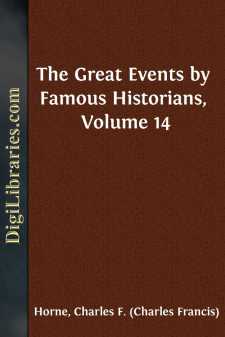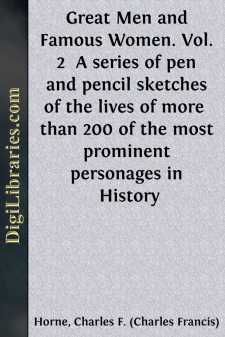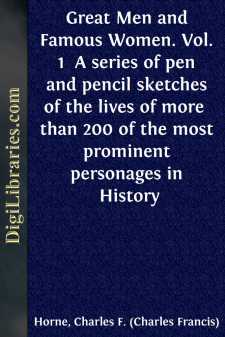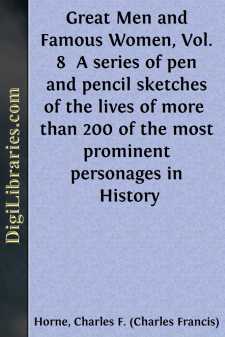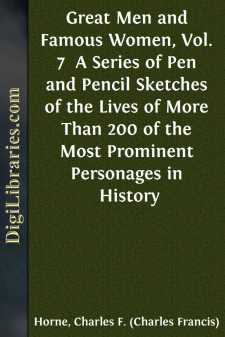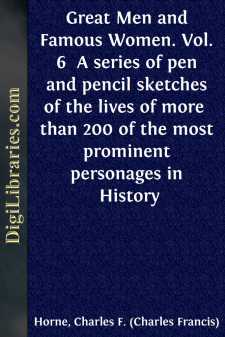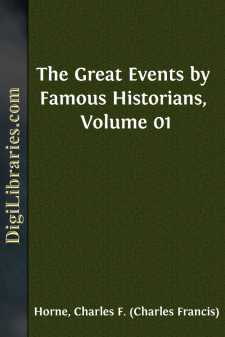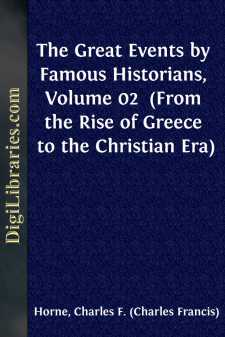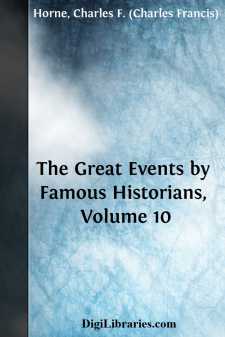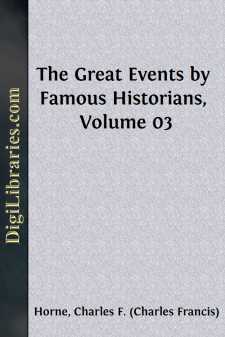Categories
- Antiques & Collectibles 13
- Architecture 36
- Art 48
- Bibles 22
- Biography & Autobiography 813
- Body, Mind & Spirit 142
- Business & Economics 28
- Children's Books 17
- Children's Fiction 14
- Computers 4
- Cooking 94
- Crafts & Hobbies 4
- Drama 346
- Education 46
- Family & Relationships 57
- Fiction 11829
- Games 19
- Gardening 17
- Health & Fitness 34
- History 1377
- House & Home 1
- Humor 147
- Juvenile Fiction 1873
- Juvenile Nonfiction 202
- Language Arts & Disciplines 88
- Law 16
- Literary Collections 686
- Literary Criticism 179
- Mathematics 13
- Medical 41
- Music 40
- Nature 179
- Non-Classifiable 1768
- Performing Arts 7
- Periodicals 1453
- Philosophy 64
- Photography 2
- Poetry 896
- Political Science 203
- Psychology 42
- Reference 154
- Religion 513
- Science 126
- Self-Help 84
- Social Science 81
- Sports & Recreation 34
- Study Aids 3
- Technology & Engineering 59
- Transportation 23
- Travel 463
- True Crime 29
Charles F. (Charles Francis) Horne
Charles Francis Horne was an American author and editor born in 1870, notable for his extensive work in compiling historical texts and literary anthologies. He is best known for his multi-volume series, "The Great Events by Famous Historians," which offers a comprehensive collection of significant historical narratives. Horne's work has been influential in making historical and literary knowledge more accessible to the general public.
Author's Books:
Sort by:
"After us, the deluge!" said Louis XV of France. He died in 1774, and the remaining quarter of the eighteenth century witnessed social changes the most radical, the most widespread which had convulsed civilization since the fall of Rome. "As soon as our peasants seek education," said Catharine II of Russia to one of her ministers, "neither you nor I will retain our places."...
more...
MARSHAL TURENNE(1611-1675) Henri de la Tour d'Auvergne, Vicomte de Turenne, esteemed, after Napoleon, the greatest of French generals, was born September 16, 1611. He was the second son of the Duc de Bouillon, Prince of Sedan, and of Elizabeth of Nassau, daughter of the celebrated William of Orange, to whose courage and talents the Netherlands mainly owed their deliverance from Spain. Both parents...
more...
With the death of Sardanapalus, the great monarch of Assyria, and the taking of Nineveh, the capital city, by the Medes, the kingdom of Assyria came to an end, and the vast domain was parcelled out among the conquerors. At the time of the catastrophe, the district of Babylonia, with its capital city Babylon, was ruled as a dependent satrapy of Assyria by Nabopolassar. Aided by the Medes, he now took...
more...
Phidias, one of the greatest sculptors the world has seen, and whose name has become, as it were, the synonym of his art, was born at Athens about 500 B.C. He belonged to a family of artists, none of whom indeed were distinguished in their profession, but their varied occupations furnished the atmosphere in which such a talent as that of Phidias could best be fostered and brought to maturity. His...
more...
The poems of Homer differ from all other known poetry in this, that they constitute in themselves an encyclopædia of life and knowledge at a time when knowledge, indeed, such as lies beyond the bounds of actual experience, was extremely limited, but when life was singularly fresh, vivid, and expansive. The only poems of Homer we possess are the "Iliad" and the "Odyssey," for the...
more...
Some of Arnold's biographers have declared that he was a very vicious boy, and have chiefly illustrated this fact by painting him as a ruthless robber of birds'-nests. But a great many boys who began life by robbing birds'-nests have ended it much more creditably. The astonishing and interesting element in Benedict Arnold's career was what one might term the anomaly and incongruity...
more...
General Introduction THE GREAT EVENTS BY FAMOUS HISTORIANS is the answer to a problem which has long been agitating the learned world. How shall real history, the ablest and profoundest work of the greatest historians, be rescued from its present oblivion on the dusty shelves of scholars, and made welcome to the homes of the people? THE NATIONAL ALUMNI, an association of college men, having given this...
more...
B.C. 413SIR EDWARD SHEPHERD CREASYThat great writer of the history of the Romans, Thomas Arnold, says of the defeat of the Athenian fleet at Syracuse: "The Romans knew not, and could not know, how deeply the greatness of their own posterity, and the fate of the whole western world, were involved in the destruction of the fleet of Athens in the harbor of Syracuse. Had that great expedition proved...
more...
CHARLES F. HORNE Philip II succeeded his father Charles V on the throne of Spain. The vast extent of his domains, the absoluteness of his authority, and, above all, the enormous wealth that poured into his coffers from the Spanish conquests in America, made him the most powerful monarch of his time, the central figure of the age. It was largely because of Philip's personal character that the great...
more...
THE GREAT EVENTS (THE PERIOD OF THE ROMAN EMPIRE) CHARLES F. HORNE So vast and wonderful a construction was the Roman world, so different from our own, that we are apt to imagine it as an arrangement far more deliberately planned, far more mechanically complete, than it appeared to its own inhabitants. From a cursory glance, we may carry away wholly mistaken conceptions of its thought and purpose....
more...


